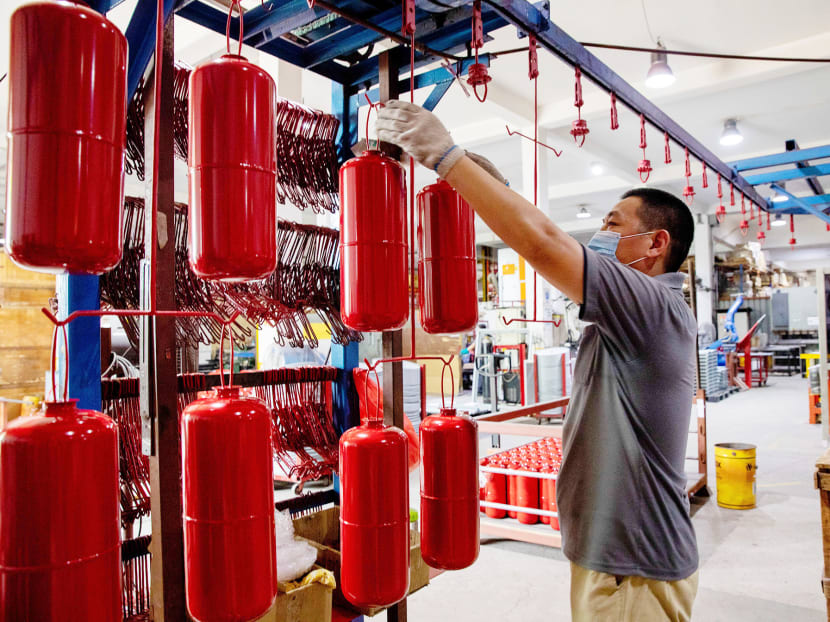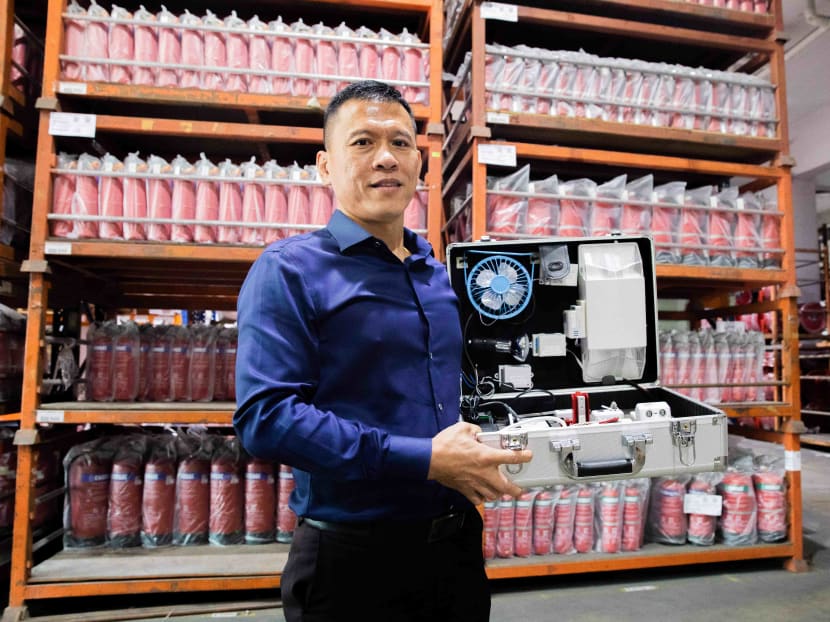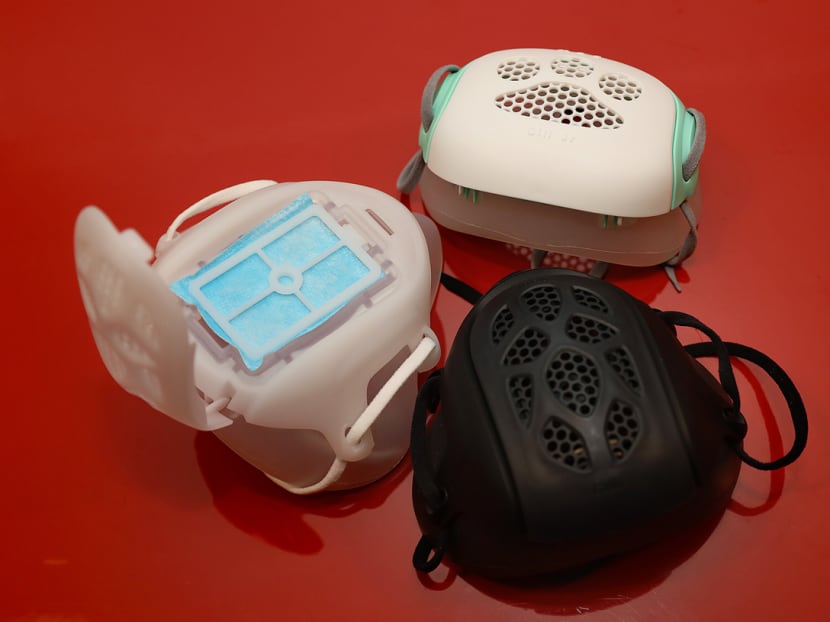The Big Read in short: Singapore’s economy, businesses at a crossroads
Each week, TODAY’s long-running Big Read series delves into the trends and issues that matter. This week, we look at Singapore’s post-pandemic economic transition and what must be done to emerge stronger from the crisis. This is a shortened version of the full feature.

Around 64 per cent of Singapore entrepreneurs have tried new business models and learnt to improve their incomes, according to a new study by Sea Insights, the policy arm of Singapore unicorn Sea Group.
Each week, TODAY’s long-running Big Read series delves into the trends and issues that matter. This week, we look at Singapore’s post-pandemic economic transition and what must be done to emerge stronger from the crisis. This is a shortened version of the full feature, which can be found here.
- Amid Covid-19, some firms have successfully retooled their business models completely to seek new opportunities
- Among other things, these firms have embarked on digitalisation, automation, e-commerce or switching their businesses to meet demands from the healthcare industry
- One study found that around 64 per cent of Singapore entrepreneurs have tried new business models during the pandemic
- Deputy Prime Minister Heng Swee Keat had stressed that Singapore is now “at a critical juncture in our economic development”
- Waiting for a vaccine to appear and so that business can go back to normal is not a viable solution, said experts
SINGAPORE — As Singapore and the rest of the world prepare to reboot their distressed economies under the shadow of Covid-19, homegrown businesses such as fire safety engineering firm Lingjack have found themselves at the crossroads.
They may have enjoyed the good years in the past, but with how the economy is faring today, businesses have to go back to the drawing board to figure out how to survive in a new normal replete with unknowns.
Official estimates say the economy is expected to contract by up to 7 per cent this year, its worst performance since independence.
Even the best economic model is not immune to changes and challenges as a shrinking workforce, worsening global economy and now Covid-19 have resulted in structural shifts that are forcing the nation to grapple with a fundamental question: How can Singapore reposition itself in a much-changed world?
Delivering a ministerial statement in Parliament on Monday (Oct 5), Deputy Prime Minister Heng Swee Keat stressed that Singapore is now “at a critical juncture in our economic development”.
Five structural shifts have impacted Singapore:
Weakening support for globalisation
A renewed impetus for digitalisation
The rise in Asia’s economic weight
The growing importance of sustainability and the environment
The need to raise labour productivity
The stakes are high, said Mr Heng, as he announced further plans to refresh an economic strategy.
As Institute of Policy Studies’ (IPS) senior research fellow Christopher Gee put it: “We have to look beyond the present and identify what are the industries that will need to be revised completely, and what areas of strength Singapore wants to keep.
“Essentially, what was 10 to 20 years of change have been compressed into a couple of years. Those who will win are the ones agile enough to transform in these one to two years,” he added.
INNOVATION DURING A CRISIS
Around 64 per cent of Singapore entrepreneurs have tried new business models and learnt to improve their incomes, according to a new study by Sea Insights, the policy arm of Singapore unicorn Sea Group.
The study also found that 29 per cent of entrepreneurs had increased their use of ecommerce selling, reflecting how businesses had shifted online to capture new sources of growth.
While most businesses are trying out new solutions during the pandemic, a minority — 36 per cent according to Sea’s study — have not. Sea's group chief economist Santitarn Sathirathai said it is not uncommon to see entrepreneurs “playing defence” during a crisis situation so that the business can survive.
Three companies interviewed by TODAY are among those which decided not to sit still and to adjust their business models while the pandemic is ongoing.
Lingjack, a fire safety manufacturer that makes the Combat brand of fire extinguishers, is making strides to pivot the business to one that also deals in technology, said its chief executive Kenneth Lim.
In 2017, with the help of business development agency Enterprise Singapore, Lingjack managed to automate 90 per cent of his labour-intensive production lines as it was facing a labour crunch.
He brought on board software and enterprise hardware engineers to aid in the transition, who later also developed an enterprise resource planning system in-house which made his operations 60 per cent more efficient.
With remote work becoming the norm in Covid-19, this enterprise solutions have attracted much interest from other firms interested, and Mr Lim now wants to make industry technological solutions a part of its core business model.

Local start-up Mdesign Solutions charted a new path during Covid-19 by moving from a design consulting firm for external clients to becoming a full-fledged manufacturer of its own product
It had a previous project producing snorkeling masks for a client
When Covid-19 hit, the company decided to use the expertise from the snorkeling mask to design a reusable respirator called Gill Mask, said co-founders Cheong Siah Chong and Jean-Luc Fringeli.
This was the first time the company has owned, produced and marketed the final product by themselves. They incorporated a new standalone company Gill Lab, hired new staff and fast-tracked production to meet demand.
The team has sold around 300,000 units of the Gill Mask, 85 per cent of which is exported to other countries.

Mr Alvin Tan, founder of The Mind Cafe, had in the past pivoted his board games cafe business model due to falling demand from youths to focus on corporate customers.
When the pandemic affected cafe operations, there was a need to pivot again.
Mr Tan decided to start an online shop on Shopee to sell board games amid the Covid-19 crisis. As a result of the move, sales of board games have surged since the pandemic began.
Instead of retrenching staff or downsizing his business, Mr Tan bucked the general trend facing companies: He had to hire extra hands to help manage its online product listings and to coordinate with the Shopee team on its marketing and promotional strategy.
HOW SINGAPORE CAN TRANSFORM
One silver lining of the pandemic is the realisation by businesses, government agencies and Singaporeans in general that much can be done online or digitally, said Ms Selena Ling, OCBC head of treasury research and strategy.
Among the chief priorities laid out by Mr Heng in his ministerial statement is the need to remake Singapore as a Global-Asia node of technology and innovation, and to invest in economic resilience and environmental sustainability could be possible growth engines for the future economy.
Such moves are needed given the significant structural changes affecting Singapore, said Mr Heng, such as the weakening support for globalisation today.
For businesses, this means having to "de-risk" supply chains that have been hampered by geopolitics and the ongoing trade frictions between the US and China, said those interviewed.
It also means finding opportunities in this increasingly bifurcated and trade-restricted world, such as how the founders of Mdesign and Gill Lab were able to market its reusable masks due to the global shortage of masks and the export restrictions when the pandemic hit.
With governments imposing lockdowns and movement restrictions due to Covid-19, the pandemic has severely impacted industries that depend on the free movement of people, such as the tourism, transport and the meetings, incentives, conferences and exhibitions (Mice) sector.
Another key structural shift is the rise in Asia’s economic weight. By 2030, South-east Asia could become the world’s fourth-biggest economy after China, the US and Europe.
Ms Ling said what is needed for Singapore to achieve a first-mover advantage against its rivals, as well as policy adaptability, business innovation, worker agility and skills nimbleness, in addition to increased connectivity and openness to capital, talent and ideas.
The concept of a Global-Asia node had been mooted in previous Budgets.
Economic resiliency and environmental sustainability can also become growth industries in their own right, said Mr Heng.
Singapore has a 30 by 30 goal, to produce 30 per cent of its nutritional needs locally by 2030, an increase from 10 per cent today.
This has attracted global companies such as insect protein firm AgriProtein, which set up its global research and development centre in Singapore to create sustainable animal feed solutions. It now hires 21 staff as well as four interns under a traineeship programme.
Its chief operating officer Ray Deidrick said Singapore was the right choice due to its ability to attract a diverse and high quality technical team that can support the deployment of the firm’s technology globally, despite the absence of a large agriculture industry here.
RELOOKING FUNDAMENTALS
After decades of pursuing a diversified economy, could Singapore — facing structural limitations including the severely impeded flow of capital and human resources — instead focus on its competitive advantages and specialise, just as how Hong Kong's economy is built primarily on trade and finance industries?
It potentially could, said Mr Gee. Certain diminished industry sectors, such as the marine and offshore sector and less productive industries such as real estate, do not seem to be a part of Singapore’s future priorities and can be cast aside in the new normal.
“But going forward, how (do they) fit into the main priorities for the country right now?” said Mr Gee.
However, a more specialised economy entails greater volatility and risks. After all, it was Singapore's diversified economic structure that had given it resilience during the pandemic, Mr Heng had noted in his ministerial statement.
"No one industry accounts for much more than 20 per cent of our gross domestic product, so we do not put all our eggs in one basket," he said.
WHAT DOES IT ALL MEAN FOR THE S’PORE WORKER
Amid economic transformation, it is also imperative for the workforce to evolve in step with the transformation, or it would end up as a bottleneck for Singapore’s aspirations, said analysts.
Singapore faces a slowing resident labour force growth in the years ahead, on top of new pressures to recalibrate the Republic's workforce mix of locals and foreigners.
"Future economic growth will come from raising productivity across the economy," said Mr Heng.
Dr Sathirathai said Singapore workers first need important soft skills, such as critical thinking and creativity, in order to carve out new paths in the changed environment.
Sea’s study found a correlation between possessing digital literacy skills and being able to cope with the new ways of work and study that have emerged due to Covid-19. Around 76 per cent of youths polled who lacked digital skills also struggled with remote working.
Nevertheless, experts say well-performing local businesses must continue to lead the way in providing reskilling and training opportunities for the rest of the industry.
Local robotics company PBA Robotics, for example, has been running a training academy for non-employees and people outside the industry since 2017. It has trained more than 700 people in robotics, automation and digital manufacturing skills.
PBA Robotics strategy director Amrin Amin, a former Member of Parliament, said: “We believe that Singapore needs an ecosystem. No man is an island, so the more people who understand technology and robotics, the easier it is for us to find talented engineers and design professionals too.”
THE GREAT BIG HOPE, BUT VACCINE IS NO PANACEA
Instead of waiting for the uncertain arrival of a viable vaccine, it is vital that Singapore has a headstart in industry and business transformation, experts said.
While it is understandable that businesses may be hard pressed to invest more in digital transformation while in a crisis, not doing so will hurt more in the long run. The faster companies adapt, the better prepared they will be for a future crisis.
Even if an antidote to Covid-19 could be found, infectious diseases expert Leong Hoe Nam was sceptical that it would mark the true end to the pandemic, especially since he expects there to be logistical issues for a number of years.
Infectious diseases expert Leong Hoe Nam said distributing a vaccine is a mammoth task because:
The sheer volume of vaccines needed to be transported around the globe
Covid-19 vaccines will likely require extensive cold chain logistics, since early vaccine candidates appear to need storage at sub-zero temperatures, said Dr Leong.
Some vaccines also seem to require two doses to complete the vaccination, which doubles the challenge.
Many people could end up reluctant to be vaccinated for Covid-19 due to unfounded fears over its side effects.
“Even if we have a vaccine, Covid-19 will be a virus with us for the rest of our lives. We will never be able to vaccinate everyone and Covid-19 will probably circulate continuously for some time, just like many other viruses,” said Dr Leong.
For Singapore companies and workers, that leaves them with little choice but to swim with the tide brought upon by a pandemic-imposed new order, rather than continue to resist it.











